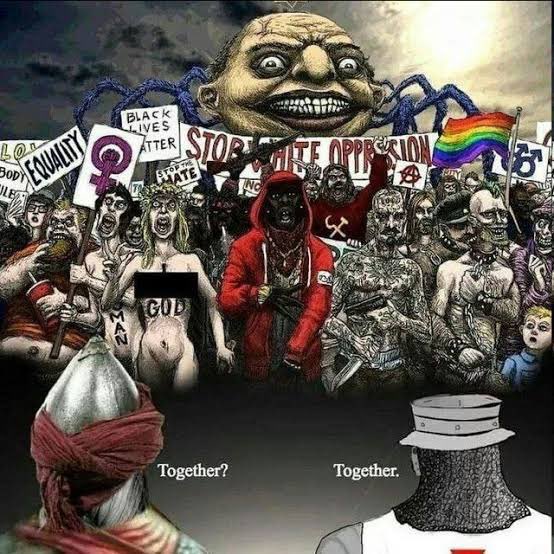Part 1: Trouble in Dearborn
In October, Muslim protestors descended on successive meetings of the Dearborn Public Schools board, to demand the removal of “LGBTQ” books that “promote pornography” and “homosexuality” from Dearborn’s school libraries.
Videos revealed angry scenes and overcrowded rooms, with loud jeers and booing directed at speakers and school board officials, while placards in Arabic and English featured denunciations of the “big sin” of homosexuality and the “grooming” of children.
Many of the protestors were there at the behest of two prominent Islamist leaders: Hassan Qazwini, head of the Islamic Institute of America, a Shia mosque in Dearborn Heights; and Dawud Walid, head of the Michigan chapter of the Council on American-Islamic Relations (CAIR).
Both are well known for their radical links. In 2010, Qazwini hosted a memorial service for Mohammad Hussein Fadlallah, the late “spiritual leader” of the designated terrorist group Hezbollah; while Walid, who fuses Islamism with black nationalism, has a long history of overt anti-Semitism and support for violent criminals.
A local NPR station reported that “most” protesting “were young men, some led by Muslim religious leaders— a contrast to the largely Christian groups that have led other efforts to restrict books in Michigan libraries.”
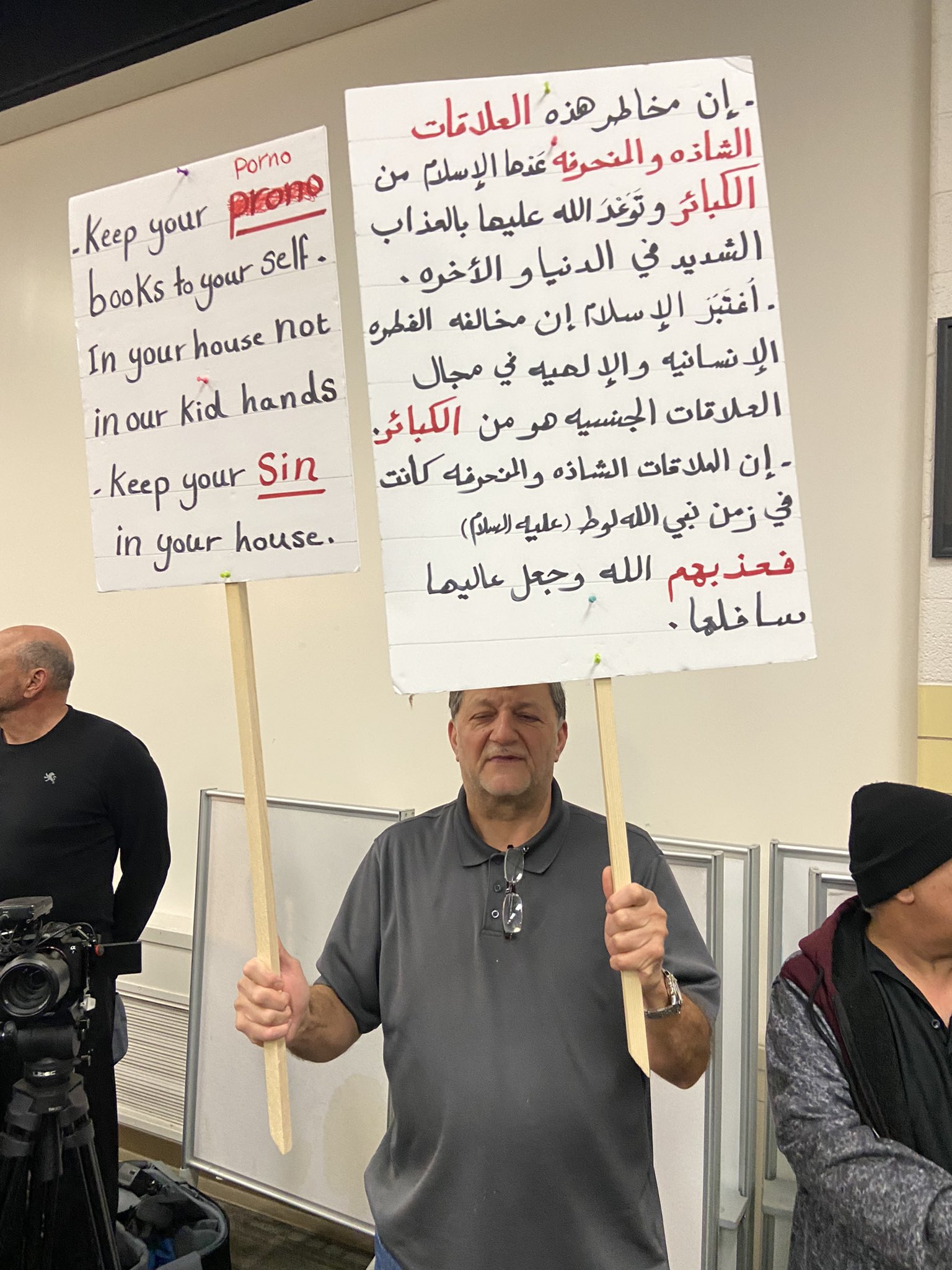
Indeed, Dearborn is a majority Arab city, a point picked up on by Qazwini in a sermon at his mosque last week, when he told his congregants: “Defend your right and lay out your demands that we don’t need those books in Dearborn and Dearborn Heights. Take them somewhere else. The majority rules. If you are the majority of people in Dearborn, you rule.”
However, in spite of the possible underlying Islamist agendas, at a second meeting on October 13, the protestors were joined in their efforts by Republican party officials, including Trump-endorsed candidates such as the Republican nominee for Secretary of State Kristina Karamo and the Republican nominee for Attorney General Matthew DePerno, who told media: “I think you’re probably seeing a shift in the Republican Party.”
Indeed, Detroit Free Press reporter Niraj Warikoo reported that State Rep. Matthew Maddock called for Muslims and Christians in Dearborn to work together to oppose “certain books and educational materials.”

Maddock’s wife, Meshawn Maddock, is co-chair of the Michigan GOP. She recently expressed praise for her new hijab-clad Muslim allies, claiming that “800 Muslim and Christian parents showed up to protest the sexualization of their kids in Dearborn Public Schools,” and had pledged to vote Republican.
Trump supporters across Twitter posted photos of “Muslim and Christian parents in Dearborn, Michigan [joining] together to protest against LGBT education in their schools.”
Prominent Right-wing commentator Dinesh D’Souza praised the protests as a “Conservative alliance of Christians and Muslims showing up the school board meeting and … shutting it down.” D’Souza even praised the radical Qazwini for his “socially and culturally conservative” efforts to “stir up the mobilization of Muslim parents.”
D’Souza concluded: “I think what we see here is that there is a limited opportunity for conservatives to ally with conservative Muslims … to defeat the Left across the board.”
Islamists, too, appear excited by this collaboration. Yasir Qadhi, a graduate of the hardline Salafi movement and one of the best-known Islamic religious leaders in the Western world, approvingly retweeted Right-wing coverage of the protests, and declared: “Conservative Christians and Jews need to understand that Muslims are their allies in wanting a purer and morally upright society.”
Muslim anger in Dearborn is no longer directed at Trump and his Muslim ban, but instead at left-leaning figures once considered champions of Islamist causes. The Detroit Free Press reports:
At times, the meeting appeared to be a political rally, with the crowd booing loudly for Democrats such as U.S. Rep. Rashida Tlaib, D-Detroit, Attorney General Dana Nessel and Dearborn Mayor Abdullah Hammoud, accusing them of being in favor of LGBTQ books the protesters believe are offensive and violate their religion.
Meanwhile, the Muslim crowd reportedly booed and heckled left-leaning figures at the school board meetings who called for “unity between gays and Muslims.”
Islamist media in Europe covered the protests, noting similar Muslim anger at “LGBTQ” teachings in Britain and the Netherlands.
Across social media, Islamist activists published cartoons in response [see featured image at top], adapted from neo-Nazi publications, illustrating Muslim and Christians standing together against Jews, blacks, homosexuals and an array of various, ostensible symbols of the evils of progressivism.
Events in Dearborn are not a lone example. Increasingly, the Right’s approach to Islam and Islamism is changing. Concomitantly, many Islamists no longer regard the Left as a useful ally, but a harmful influence.
As protest leader and CAIR official Dawud Walid preached to a Muslim audience during a recent lecture, Muslims can cope with the Right, who like “wolves,” “howl and make a lot of noise.” The greater threat, Walid claims, comes from liberals, who are “the fox that smiles” and “more likely to eat your sheep.”
Part 2: The Changing Politics of American Islam
“Reliable” Conservatives
Over the past twenty years, much has been written about the ostensible Islamist alliance with the “Left.” Terms such as the “Red-Green Alliance” have been used – by both Muslims and non-Muslims, rabble-rousers and serious academics – to refer to Left-wing attempts to solicit Muslim support, as well as Islamist efforts to hijack progressivist causes.
Before 9/11, however, and especially during the run-up to the presidential elections in 2000, Muslim Americans were a key demographic for the Republican Party.
Writing in the Washington Post, Rany Jazayerli notes that American Muslims served as a “reliable pillar of support” for decades. Jazayerli claims Muslims were attracted to the GOP by Christian influence on “social issues” such as gay marriage and abortion. “Muslim support for the Republican Party did not waver in the face of its gradual Christianization,” Jazayerli writes, “On the contrary, Muslims saw common ground.”
Spotting opportunity, in 2000, George Bush explicitly sought out Muslim leaders. He was urged on, David A. Graham writes, by “Grover Norquist, the anti-tax crusader, who argued that because Muslims are a socially conservative, family-oriented, business-friendly group they are a natural GOP constituency.”
This strategy proved particularly important in Florida, a state which won George Bush the presidency by a mere 537 votes.
However, as with so much political outreach to Western Islam, imprudent politicians and their campaign managers ended up choosing Islamist partners. After all, it was the Islamists, as innately political actors, who appeared best prepared to provide political support, notwithstanding their actual mandate from ordinary American Muslims.
In Florida, the Bush campaign sought out the help of Sami Al-Arian, a prominent professor at the University of South Florida in Tampa, and a leading Islamist activist in the state. Al-Arian served as a keen supporter of the Bush campaign, meeting with the then-Texas governor and his wife on several occasions, and campaigning for the Republicans in mosques across Florida.
Just a few years later, in 2003, Sami Al-Arian was charged with conspiring to provide funds to Palestinian Islamic Jihad, a designated Palestinian terrorist organization. It emerged he had been under federal surveillance for a decade. He pleaded guilty in 2006, and was deported. Since then, he has lived in Türkiye, with the support of the Erdoğan regime, from where he continues to manage and lead Islamist efforts in the West.
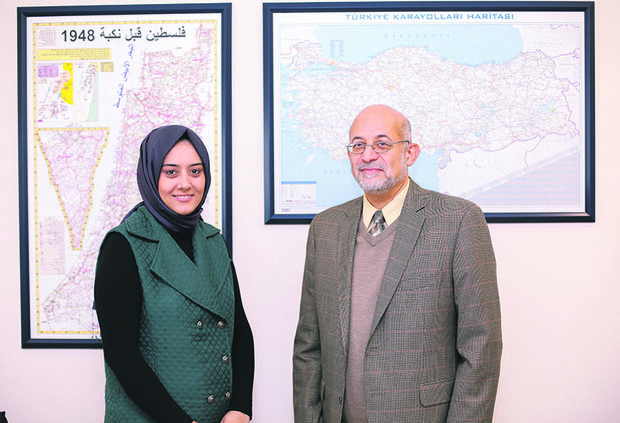
Grover Norquist, meanwhile, was closely involved in Islamist circles himself, working with not just Al-Arian but also the Muslim Brotherhood-linked SAAR network, a collection of Virginia businesses and nonprofits that federal investigators later targeted in a huge terror finance investigation. Norquist was also close to Abdurahman Alamoudi, an Al Qaeda fundraiser jailed in 2004 for conspiring with the Libyan regime to assassinate the Saudi Crown Prince.
After the election, but before their arrests, President Bush welcomed both Alamoudi and Al-Arian to the White House.
A survey carried out by the Council of American-Islamic Relations claimed that as many as 70% of American Muslims voted Republican in that 2000 election. The Islamists sought to take advantage: both to enjoy the rewards of friends in high office later, as well as to help cement their growing control of American Muslim institutions.
And indeed, the Islamists, and Al-Arian, may have been indispensable. In that crucial state of Florida, it is reported that as many as 90% of Florida Muslims voted Republican in 2000. According to newspapers in the state, Al-Arian “boasted publicly that Muslims in Florida may have tipped the close presidential election to Bush.”
The Rise of Islamist Progressivism
Following the 9/11 attacks, the Islamist approach towards national politics started to change as the nation began better to grasp the pervasive threat posed by Islamism in the United States.
Along with the arrests of American Islamist leaders, prosecutors shut down dozens of Islamist charities, uncovering multiple networks providing financial and logistical support to terrorist groups across the globe. This peaked in 2007, when the Holy Land Foundation trial demonstrated that America’s largest Muslim humanitarian aid charity was in fact the flagship institution of a major terror finance operation.
Federal prosecutors listed a huge number of prominent American Muslim organizations, and their leaders and activists, as “unindicted co-conspirators.” The public face of American Islam, it turned out, was a key component of a small but powerful Middle Eastern Islamist network that advanced extremism at home, and funded terror overseas.
In the decade following 9/11, as conservative alarm at the Islamist menace grew, American Islamism’s leading institutions increasingly turned to the Left. They did so in the face of continued federal law enforcement investigations into their activities, Republican denunciations of their activities in Congress, and a growing Leftist willingness to accept the notion of an “Islamophobia” crisis.
The first key sign of this future axis was most apparent in 2003, when a mix of Leftist and Islamist organizations organized enormous protests against the invasion of Iraq.

It remains difficult to measure the exact extent to which Islamist influence guided all these changes within the Left. Notwithstanding, Islamists certainly benefitted from the election of the Obama administration in 2008.
Federal prosecutions of Islamist charities mostly stopped; investigations into Islamist networks such as the SAAR network were shut down; and Islamists once again found themselves invited to participate in efforts to guide federal policy (even, amazingly, in the design of counter-extremism programs).
Internationally, liberal voices in the Middle East expressed alarm that the Obama administration was working with Islamist groups such as the Egyptian Muslim Brotherhood – which, at the time, maintained close ties with a number of American Islamist organizations.
Islamist groups such as the Council on American-Islamic Relations (CAIR) appeared to conclude that the Left and its protest movements afforded powerful opportunities to the Islamist agenda. Leftist politics provided Islamist groups with media attention, political influence and enough legitimacy to claim leadership over American Islam.
Liberal alliances also served to refute claims that American Islamists were working towards a theocracy. As the Cato Institute’s Mustafa Akyol has subsequently argued, America’s Muslim community does not advocate “creeping sharia” but “creeping liberalism.”
Under the Trump administration, some American Islamist groups moved even further to the Left, embracing progressivist and openly socialist campaigns and candidates.
As the Middle East Forum noted in 2019:
Prominent Muslim voices lead Women’s Marches in cities across America and argue for “intersectional feminism.” Groups such as the Council on American-Islamic Relations (CAIR) – just 10 years ago named by federal prosecutors as part of an enormous terror finance network – now spend a great deal of time publishing social media items about Black Lives Matter while also campaigning for “social justice,” prison reform and higher minimum wages. Leading Muslim clerics are to be found praising Malcolm X as “our prince,” and protesting Trump’s immigration plans at the southern border. And a few Muslim campaigners even express solidarity with transgender and “queer” activists, and publicly dream, as the prominent Islamist-linked activist Linda Sarsour puts it, of “a world free of anti-black racism, islamophobia, xenophobia, antisemitism, homophobia, transphobia, ableism, ageism, sexism, and misogyny.”
Such efforts have not been limited just to Islamist networks such as the Muslim Brotherhood. A new generation of “modernist” Salafis has come to the fore, especially as the power of the Muslim Brotherhood has waned in recent years, with the collapse of some of its branches in the Middle East.
These modernists, just a few years ago urging sharia-based punishments, can now be found protesting federal immigration policies as part of interfaith coalitions, or even justifying alliances with “LGBT” movements.
Islamist academic Jonathan Brown, for instance, argues that “Muslims in the U.S. should affirm and advocate” for various “LGBTQ rights” because “Muslims in the U.S. and LGBTQ groups seek protection for the same rights and, ironically, arguably have a common vision for the country’s future.” This same Brown previously justified slavery and rape within Islam. (Interesting, Brown is the son-in-law of Sami Al-Arian.)
It is difficult to stress quite how significant and extraordinary this ideological shift within Western Islamism has been. Most of these Salafi imams and activists’ own teachers, just twenty years ago, considered involvement with Western politics in any form to be a dangerous, sinful deviancy.
And indeed, there are many within Islamist circles who are unhappy with these changes and new political ideas, many of which appear patently at odds with traditional Islamic values, and certainly with any Islamist agenda.
Part 3: Islamists Throw Off Their Progressivist Shackles
Largely unnoticed outside of Islamist circles, a new generation of American Islamists is increasingly upset that their leaders in the West so hastily backed the progressivist rhetoric and activism around all sorts of modish issues.
Some, for instance, have noted that the Black Lives Matter movement may violate Islamic moral values and that Islamic leaders would come to regret this over-reliance on the Left.
Yasir Qadhi, one of the most important Muslim voices in the Western world, has lamented the fact that Muslim student groups’ progressivist activities were leading them into “sinful” ideas such as “Queer Muslims” celebrations.
Qadhi observes the dilemma that American Muslims face:
The groups that identify with Trump’s racism and bigotry generally would agree with many aspects of our morality and ethics. And the groups that want plurality and diversity and would welcome us (even if only for the token diversity) aren’t too keen on our exclusivist moralistic values and concrete ethical framework.
At the very least, the Left should be rejected, claim some leading Islamist commentators. Mobeen Vaid, a prominent commentator on American Muslim politics, notes:
For years now, one of the major criticisms I’ve made of Muslim leaders and activists is that they have inappropriately thrust young Muslims into far-left activism by making use of progressive vernacular and rhetoric and mostly remaining silent on aspects of Islam that contradict progressive pieties. No one wants to lose “allies,” it seems.
Some take a more cynical stance. Writers at Mukashafat, a Muslim American blog, have suggested that these progressivist-leaning Islamists will “[struggle] in the Biden era.”:
Donald Trump is gone from the White House, but let’s face it: The Donald was good for business for the Islamist groups who claim to represent us. No more Muslim travel ban. No more urgent federal civil rights lawsuits… And perhaps not as many donations to CAIR.
Whether Islamists’ embrace of the Left was genuine or not, across American Islam, a growing number of activists and purist-minded imams began to argue that such a tight embrace has nonetheless radicalized Islamists’ own children into believing that issues such as transgenderism, “LGBT” rights, gender “pronoun” obsessions and even the right to abortion are all somehow acceptable within Islam.
One of the leading voices in this outcry is Daniel Haqiqatjou, a social media activist and preacher. Haqiqatjou has built an enormous following online, with hundreds of thousands of Western Muslims following his work denouncing the activities of “compassionate imams” who once openly identified as Salafi or Muslim Brotherhood, but who now, Haqiqatjou wails, embrace feminists, homosexuals, transgender activists, among other apparent affronts to Islamic sensibilities.
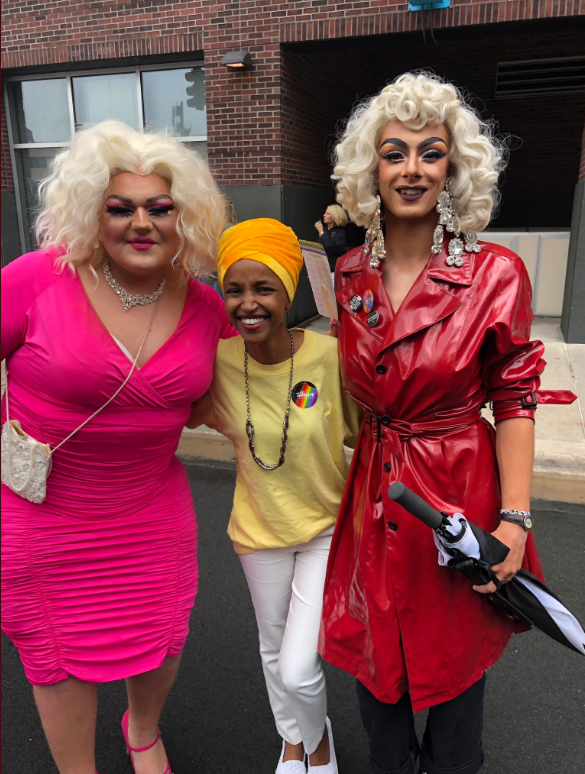
Haqiqatjou reserves particular anger for Muslim politicians such as Representative Ilhan Omar, and her involvement with transgender causes and other “kufr” ideas.
When we interviewed Haqiqatjou in May 2022, he explained that Muslims like him are portrayed by conservatives as aiming to take over the government and “establish a Sharia state.”
The actual threat to Americans, he claims, is that “their children have become… atheists… their sons degenerates, and their daughters are prostituting themselves.” Moreover, their lives “have no meaning or purpose,” all due to “the dangers of liberalism.”
Haqiqatjou’s online publication, Muslim Skeptic, has recently brought on commentators from the Deobandi sect – an important hardline strain of Islam. One of Haqiqatjou’s partners, a Deobandi named Yasir Nadeem Al Wajidi, regularly posts praise of Haqiqatjou for his work “refuting and dismantling atheism and liberalism in the Western world.” Wajidi’s 1.9 million followers on Facebook have given Haqiqatjou and other critics of “progressivist Islam” a powerful boost.
Some Muslim commentators have dubbed Haqiqatjou and other critics as part of the “akh-Right” – a play on the Arabic word for “brother” and the much-discussed phenomenon of the Western “alt-Right.”
The dissent is not limited to American Islamists such as Haqiqatjou. European Islamists, such as Mohammad Hijab (who has otherwise been busy egging on the recent anti-Hindu violence in Britain), have published videos warning Yasir Qadhi and others to end this tolerance of “LGBT.”
These purists are having an effect. As one online Muslim commentator noted, after watching the leading American imam Omar Suleiman, who graduated from hardline Salafi circles, take part in an “interfaith” protest against federal immigration policies: “I was appalled by the free mixing, holding hands/linking arms, lack of personal space with the opposite gender, the open use of pagan rituals such as anointing and libation.”
In the face of an “akh-Right” campaign, Suleiman later apologized.
Interestingly, much about modern Western Islamism is curiously non-clerical. The divisions dividing radicals into all these various factions revolve around Western political arguments, rather than Islamic theological matters. Figures such as Daniel Haqiqatjou often launch into diatribes about the supremacy of Islam and the iniquities of those who ostensibly dilute the faith, but he and his crowd do not issue fatawa and shy away from purely theological discussion.
A significant shift is occurring. Officials of major Islamist organizations such as the Islamic Circle of North America, a branch of the South Asian Islamist Jamaat-e-Islami movement, have now, after years of silence on the matter, suddenly taken to committing publicly that their organizations will not sanction “perverted attitudes” towards “LGBT” issues.
Canadian Islamist Siraaj Muhammad, head of the popular Islamist website Muslim Matters, recently wrote on his social media of his previous despair at Muslims having to “remain silent” as “progressive muslims” pushed “LGBTQ identities,” abortion and gender identity issues. But he is now hopeful for change:
It’s been deeply encouraging to see leaders give video talks, khutbahs [sermons], programs, and khatirahs [reminders] pushing back on these issues. I hope inshaAllah we continue to divorce ourselves from the progressive and centrist left, politically, intellectually, and emotionally, and likewise not run to the far right either, but to ground our priorities on our community’s priorities.
A growing proportion of American Islamists is beginning to reject the Left. More interestingly, some, it seems, are even now embracing the Right.
The Lure of the Right
A small but growing number of activists across the Muslim community, many of whom espouse openly Islamist ideas, today advocate for an alliance with the American Right. It is American conservativism, a growing number seem to believe, that better fits with Islamic ideas about family and faith.
The Mad Mamluks, a popular Islamic podcast series that frequently promotes Islamist ideas, has discussed this phenomenon repeatedly, with its hosts noting:
I understand why Muslims as a group of people may feel like they may have allies on the Left, and they may feel alienated from the Right, even though, in a lot of ways, at the core, by moral values, the Right is probably closer to the way we view society.
Another popular program, The Deen Show, has run events with a number of Conservative activists, include Brenda Lebsack, a prominent campaigner against the imposition of teachings about “transgender” politics in American schools. Lebsack warned her new Muslim audience that far-Left transgender advocates are “going after Muslim youth.”
Lebsack has also been invited to mosques, such as the Islamic Institute of Orange County, where she discussed “what Muslims need to know” about the “teaching of transgender ideology in California schools.” She shared a stage with radicals such as Mustafa Umar, a prominent Islamist imam involved in a recent campaign to boycott Muslim groups that partner with the American Jewish Committee.
Some activists are working, it seems, to generate a long-term plan for alliances with conservatives.
Ismail Royer, for instance, a former convicted jihadist who now works for the multi-faith Religious Freedom Institute in Washington D.C., has called for an Islamic alliance with conservative Christian movements to oppose threats such as gay marriage and abortion. Royer warns that the “progressive Left” is working to “change Islam” and has claimed that Biden is working to have his administration “stocked” with “left Muslims” who “consider orthodox Sunnis as extremists.”
Royer also supports libertarian activists’ efforts to allow parents to redirect their “state-funded education dollars to the education providers of their choosing.” Citing conservative and libertarian campaigns to give parents greater control over their child’s publicly-funded education, Royer declares: “Take your kids out of public school and put them in Islamic school.”
Then there is Abdullah bin Hamid Ali, founder of the Lamppost Education Initiative and the head of Zaytuna College’s Islamic Law Council. He has urged American Muslims to join him in a “new political vision” that rejects “neoliberalism” and paints conservativism as a more natural home for American Muslims, even if Trumpism is hostile.
These days, Ali’s Twitter feed comprises many dozens of Tucker Carlson clips and comments about the follies of anti-capitalist and anti-racist protest movements.
Some Islamists sound positively Trumpian. Abdullah Yousef, a Muslim American writer, declares:
A lot of Muslims are under the impression that when they side with the Democratic party, including their hoaxes and ideologies (including the COVID regime tyranny), that they’re with the majority. They could never be more wrong. The sick people they imitate for American approval are the real minority, and do not represent the will and wants of the majority that continues to grow larger the more the left humiliates itself. I’m paying very close attention to the 2022 midterms to see if my people here are changing overall for the better, as indicated somewhat by the 2020 election where Muslim Republican votes doubled compared to 2016.
The most extreme Islamists even regard the “far-Right” as suitable allies. In February 2022, Daniel Haqiqatjou, the leading Islamist voice against the evils of progressivism, found himself in close agreement with Mark Collett, a prominent British neo-Nazi whom Haqiqatjou invited onto his YouTube channel.
Both warmed to each other over shared fears of liberalism, secularism and the perceived threat of the Left. As we wrote at the time, the conclusion of the meeting appeared to be that “Collett the white nationalist would apparently not mind an Islamic theocracy in Europe, so long as it is a ‘white ethnostate.’ Haqiqatjou the Islamist, meanwhile, seemed unfazed by the idea of a white ethnostate in Europe, so long as it is Islamic.”
Islamist outreach to the American Right is not just a domestic affair. The Islamist Qatari government has put a great deal of effort into working with Republican congressmen.
U.S. Senator Lindsey Graham has become a particularly keen advocate for the regime, attending its events in Doha, coordinating billions of dollars of Qatari investment in his home state of South Carolina, and echoing the regime’s negative talking points about the politics of the Gulf, especially regarding Saudi Arabia.
Even if Graham’s political alignment did not matter to the Qataris, other signs indicate that Doha regards the Right as an important target more broadly. In 2019, the Middle East Forum uncovered Qatari monies finding their way into conservative media coffers, buying conservative columnists and multiple pages of the Washington Times.
For many years, the Qatari regime even attempted to build a conservative media outlet, named Rightly, overseen by officials poached from Conservative outlets such as Fox News.
Meanwhile, outlets such as Middle East Eye, which works to advance the Qatari regime’s interests, have employed prominent conservatives such as Peter Oborne, a leading Right-wing British journalist. Oborne refers to the Muslim Brotherhood as a “great movement,” defends terrorist financing groups such as Interpal, and, in his book in defence of the Iranian regime, he writes: “One of the greatest theologians of all time, [Ayatollah] Khomeini’s teaching contained insights which went far deeper than anything the rationalists and materialists of the United States could imagine.”
Pakistani Islamists have also sought to work increasingly closely with the American Right. In 2020, a Houston Islamist network tied to the Pakistani regime brought Republican Congressman Jim Banks, along with his Democratic colleague Sheila Jackson Lee, to address a webinar organized by open supporters of terror. The hosts were the Pakistani, along with leading Islamist Ghazala Habib, a Houston-based activist who runs a global network of Islamist and Pakistani operatives in coordination with the Pakistani regime.
Habib served as the official “representative” of the late Kashmiri jihadist leader Syed Ali Shah Geelani and well as Asiya Andrabi, head of Dukhtaran-e-Millat, which, The Economist notes, “supports terrorists” and advocates jihad.
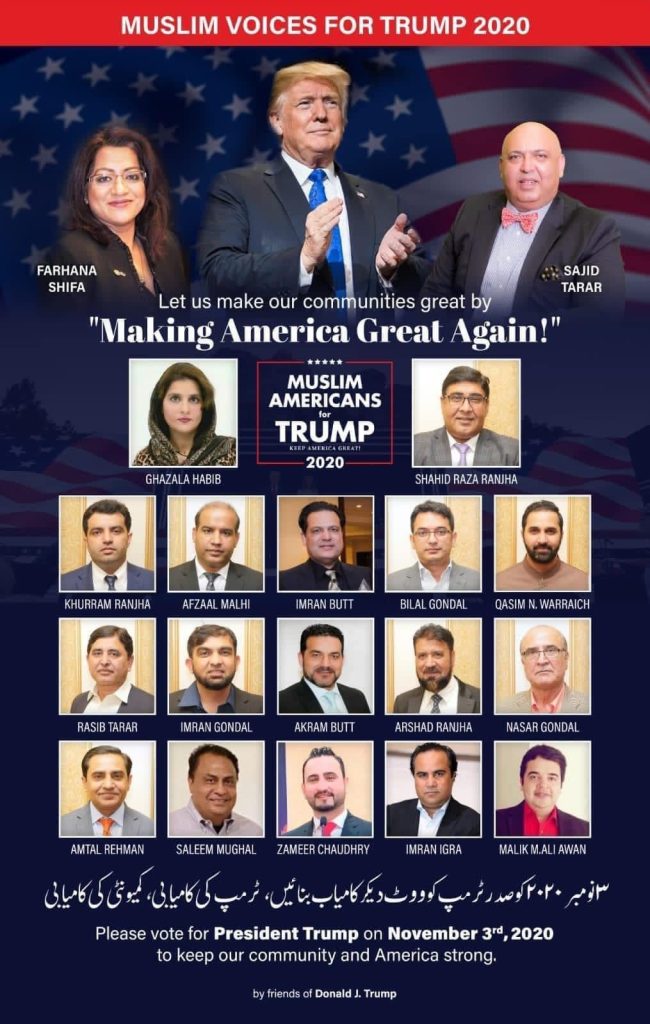
Habib also appears to be a leading member of “Muslim Americans for Trump.”
Habib’s partners in Houston includes Islamist activists such as Sajjad Burki, who runs the FARA-registered U.S. branch of Pakistan’s PTI, which ruled Pakistan for years under Prime Minister Imran Khan. Burki recently met with Democrat Senator Chris Van Hollen, to warn him that “more Pakistani Americans may vote Republican because of Joe Biden’s stance towards Pakistan.”
American Islamist PACs are also increasingly funding Republican coffers. The Pakistani-American Political Committee, or PAKPAC, is the chief lobbying organization and election financier for Pakistani interests in the United States; and is closely connected to a number of American South Asian Islamist activities. PAKPAC has contributed to the finances of many Republicans’ election campaigns.
Another, the Islamabad-aligned American Pakistani Public Affairs Committee (APPAC), works closely with Senator Lindsey Graham, whom it describes as a “longtime friend and supporter of APPAC.” A variety of Turkish regime proxies have also given significant amounts to Graham’s re-election campaigns.
Whether the growing Islamist embrace of the Right simply serves the geopolitical interests of foreign Islamist regimes, or whether it is the corollary of growing Muslim dissatisfaction with the spread of progressivism at home, conservatives cannot have failed to notice the new opportunities that Islamist alliances could bring.
Part 4: The Right Inches Closer to Islamism
Maajid Nawaz set up the Quilliam Foundation in 2007. The first counter-Islamist Muslim think tank, it worked to counter the pernicious threats of radicalization and terrorism – partnering with Britain’s Home Office and various law enforcement agencies and governments all around the world.
Nawaz was the right man for the job. A former member of Hizb ut-Tahrir, an international Islamist movement with deep ties to terror, his Islamist activities ended with four years imprisoned in an Egyptian jail. Upon his release, he renounced Hizb ut-Tahrir and Islamist ideas. His subsequent, highly praised counter-extremism work (which made him the target of Islamists all around the world) eventually led to his appointment as Prime Minister David Cameron’s counter-extremism advisor.
He has long held broader political ambitions. However, despite standing a few years ago as a parliamentary candidate for the Liberal Democrats, a Left-leaning political party, in recent years, Maajid Nawaz has dropped his counter-Islamist work and embraced a new political identity, referred to by some – whether fairly or not – as the “alt-Right.”
Fired from his radio broadcasting job, and with the Quilliam Foundation shut down, Nawaz now spends his days advancing anti-“globalist” views through his various podcasts and online writings. Followed by many tens of thousands, Nawaz advances pro-Putin regime conspiracy theories about Ukrainian “bioweapons” labs, declares “HUGE CRACKS in the state’s 9/11 NARRATIVE,” and has expressed a variety of questionable claims about vaccines and election fraud.
Most curious, however, has been Nawaz’s gradual shift on the question of radical Islam.
Following the stabbing of Salman Rushdie, Nawaz tweeted that “Muslims will be scapegoated, again.” He has attacked a Leftist activist for using the term “sharia,” and has partly-endorsed claims by the Qatari regime-backed outlet, Middle East Eye, that David Cameron, his old boss, launched a “cold war on Islam.”
Most extraordinarily, Nawaz has denounced Biden for criticizing Pakistan, and defended deposed Pakistani Prime Minister Imran Khan as a fearless leader who took a stand against corruption, and was ousted as a part of a “globalist,” U.S.-backed conspiracy.
Khan was a dangerous figure, whose regime advanced Islamism across the world and funded and supported terrorism, from the Taliban in Afghanistan and jihadists in Kashmir to Hamas in the Gaza strip. Domestically, Khan established huge efforts to advance various methods of “Islamization” across Pakistan, making use of approaches pioneered during the dictatorship of Zia Ul Haq.
Despite all this, Nawaz – who as a counter-extremist spoke out against the misuse of “Islamophobia” accusations to shut down debate – now claims that “it’s an anti-Muslim slur to inaccurately introduce [Imran Khan] using the term ‘Islamist.’”
Whether Nawaz genuinely believes the conspiracies, or whether he has happened on a self-serving, lucrative new career is up for debate. Either way, he understands, perhaps more than anyone, the political changes around Islam and Islamism in the West.
Speaking on Joe Rogan’s podcast in January 2022, he declared: “Muslims are a lot more conservative… they used to vote … Republican … And then Iraq happened, and they switched to the Democrats…we’re in a moment now where that switch is going … very slowly, back to the Republicans.”
Nawaz’s collection of conspiracies and new worldview is leading his legions of fans in a certain direction, with one supporter stating: “[Islam] used to be portrayed as our enemy or something, when I would much rather live in a conservative traditional Muslim society than whatever the west is trying to make.”
Nawaz is not the only “alt-Right” figure soft-pedaling the problems of radical Islam. In December 2021, Jordan Peterson, the controversial but interesting psychologist and commentator, subscribed to by millions, invited British Islamist Mohammad Hijab onto his podcast. Hijab – an unapologetic anti-Semite – has recently encouraged Muslims in the British city of Leicester to respond violently to “Hindu fascism” in the city.
Peterson has met repeatedly with other American Muslim voices with Islamist ties, including Hamza Yusuf, head of the Zaytuna Institute. In May 2022, Peterson and Yusuf conducted an online discussion about “What We Can All Learn From Islam & The Quran.”
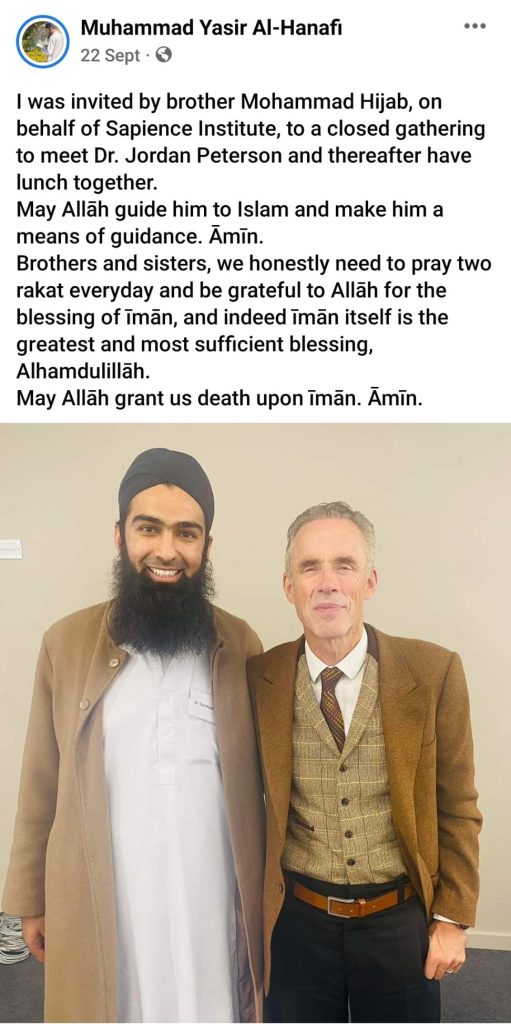
Yusuf is not just the subject of interest by figures such as Peterson, but has enjoyed support from mainstream Republicans as well. In 2019, he accepted a position in the Trump administration’s Commission on Unalienable Rights.
Peterson and Nawaz may be interesting case studies, but they are not mainstream conservatives, even if their ideological worldview has gained ground within Republican circles in recent years. The GOP itself, however, is also changing its tune on the question of Islamism.
The GOP
On July 9, tens of thousands of Somali Muslim Minnesotans gathered to celebrate Eid Al-Adha at “Super Eid,” an enormous event organized by dozens of Minnesota Muslim organizations at the U.S. Bank Stadium in Minneapolis.
If America’s best-known Muslim, Representative Ilhan Omar, was even at this important, vast event – which took place in her own district and was covered by international television stations such as Al Jazeera – she was keeping a low profile.
It was instead Minnesota’s Republican Party officials and politicians, including gubernatorial candidate Scott Jensen, who were paraded as honored guests, selling their political ideas to attendees.
Republican officials, including the Minnesota GOP head David Hann, took pictures with Islamist leaders, including Waleed al-Maneese, president of Dar Al Farooq, another organizing body behind Super Eid. Egyptian counter-extremism analyst Hany Ghoraba notes that Maneese has “cited Islamic scripture accusing Jews of spreading ‘corruption in the land’ and has instructed Muslims to place Sharia law above ‘man-made’ laws.”
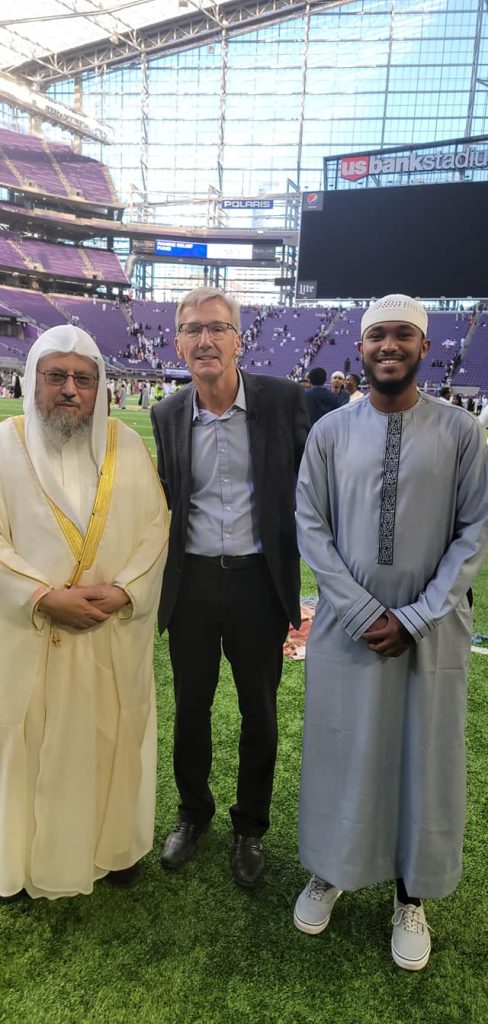
Super Eid organizers are closely involved with the Minnesota Republicans. Tawakal Ismail, who addressed the crowds of attendees, appeared to manage the GOP’s involvement in the event. Ismail is an active party member, arranging the Minnesota Somali Republican Dinner on September 24.
On his social media, Ismail appears to have posted sermons about the “massacre” of Muslim people by the “Jews of Israel.” Ismail, along with several other Super Eid speakers, is a graduate of the Islamic University of Minnesota, a Salafi institution run by Waleed al-Maneese, and which has a well-established record of teaching extremism.
Not content with merely showing up, the Republicans at Super Eid handed over money as well. A GOP press release on Republican involvement with the event reports that:
MNGOP Chair David Hann was greeted with great appreciation when he respectfully stepped forward to pledge $5000 to assist in famine relief. The donation will be made to a charitable organization that has a record of direct support to the people in need. The good will engendered by this contribution and the Republican presence at the stadium will be best measured in the voting outcomes this fall.
When contacted for comment, the Minnesota GOP refused to state to which charity the money was paid, or whether it came from party coffers.
The most likely recipients are the two humanitarian aid charities that sponsored Super Eid: Islamic Relief USA and Helping Hand for Relief and Development (HHRD).
Islamic Relief and its branches stand accused by legislators, journalists and counter-terrorism analysts of funding extremism across Europe, and terrorism in the Middle East. A December 2020 press release by the U.S. Department of State noted the charitable franchise’s “blatant and horrifying anti-Semitism and glorification of violence.”
HHRD, meanwhile, is a proxy for the violent South Asian Islamist movement Jamaat-e-Islami. In 2017, the charity openly partnered with the designated Pakistani terror group Lashkar-e-Taiba, which carried out the deadly 2008 Mumbai attacks, in which 166 were murdered. In March 2022, three members of Congress wrote to U.S. Attorney General Merrick Garland to warn about HHRD’s activities and noted that, in 2019, an “organizer of an ICNA/HHRD fundraiser was convicted of lying to the FBI as part of a terror finance investigation.”
Meanwhile, radical imams such as Asad Zaman offered sermons at the event. Zaman is head of the local branch of another Super Eid organizer, the Muslim American Society (MAS). In 2008, federal prosecutors named MAS officials as unindicted coconspirators in a major terrorism case. Posts promoted by Zaman on his Facebook account include a wide variety of extremist content, such as expressions of support for convicted Islamist war criminals and links to a neo-Nazi, Holocaust-denial website, which promotes viciously anti-Semitic conspiracy theories.
There is cause to be alarmed by this newfound Republican willingness to partner with the Super Eid organizers. Minnesotan GOP officials were not just embracing a neglected Muslim demographic; they are offering legitimacy, and seemingly funding, to hardline Islamists.
Ten years ago, involvement with such imams and groups would likely have generated a serious backlash in conservative press. When did all this change?
Despite the pugnacious nature of Trump’s comments about Muslims and radical Islam in 2016, it was in fact his administration that introduced a surprisingly permissive approach to domestic Islamism.
The Middle East Forum’s study of federal spending in 2021 revealed:
Trump’s federal government gave out, on average, almost three times as much cash to American Islamic organizations per year as it did under Obama. … [Of] the $63.5 million of federal monies given to domestic Islamic groups since 2009, $37.6 million has gone to groups with some degree of Islamist influence. In just four years, the Trump administration was responsible for over $26 million of that total sum. In other words, under Trump, America has served as a leading state sponsor of nonviolent Islamism.
Monies were handed out to a wide variety of dangerous Islamist groups, including organizations deemed too radical by the Obama administration, such as the Council on American-Islamic Relations, as well as charities under investigation for terror finance.
The Trump administration’s involvement with Islamists was not just financial. Senior administration officials met repeatedly with Islamist organizations. Charities such as Islamic Relief were even invited to events hosted by Trump’s daughter, Ivanka.
Our studies of federal contact with Islamist groups under Trump were steadfastly ignored by conservative press. Media outlets that had run dozens of our essays and articles in the past refused to touch them, including one popular Right-leaning outlet dedicated to coverage of radical Islam in America.
For many, it is difficult to imagine that the Trumpified conservative movement in America could have come to regard Islamism in the West as a potential partner. More likely, the Trump administration’s willingness to fund and empower Islamists was the result of a growing indifference to the subject of radical Islam.
But as Super Eid, Dearborn and other presented examples illustrate, the latter may well have helped to set the stage for the former.
There are other incidents worth noting. In August 2022, four Republican congressional candidates agreed to take part in a candidates’ forum at the Mosque Foundation in Bridgeview, Illinois. Perhaps one of the most extreme Islamist institutions in North America, the Mosque Foundation has been the subject of multiple federal investigations over terror finance ties.
When questioned publicly about their attendance, two of the Republican candidates withdrew; the remaining two, however, still happily took part.
In May 2022, Republican candidate Greg Raths featured in a candidate forum at the Orange County Islamic Foundation, where he told the Muslim audience, according to the Washington Free Beacon, that the “’Jewish community’ uses money to ‘control’ U.S. politicians.” A year earlier, reports the Investigative Project on Terrorism, the mosque’s imam called Israelis “child killers” and urged Muslims to “sacrifice whatever resources we can in defense of that land.”
Trump himself also continues to disregard Islamism. In April 2022, he endorsed Dr. Oz, the popular television presenter, as the Republican nominee for the upcoming United States Senate election in Pennsylvania. He did so in spite of Oz’s widely-reported ties, first revealed by the Middle East Forum, to the Turkish regime, with which Trump himself enjoyed a close relationship.
A month later, Trump declared that Oz’s rival for the nomination, Kathy Barnette, has “not been properly explained or vetted,” after it emerged that Barnette had expressed some anti-Muslim views.
Subsequently, Responsible Statecraft, a publication itself linked to the Iranian regime proxies in the United States, noted:
A lot has changed in Republican politics for Trump to endorse a Muslim candidate and denounce his Islamophobic rivals. The “War on Terror” seems to finally be fading from public consciousness, and hawkish Middle East policy — which was joined at the hip with anti-Islam sentiment — no longer dominates Republican politics.
One key official at Responsible Statecraft, Kelley Beaucar Vlahos, is the former executive editor of the influential American Conservative. The late Mark Perry, who encouraged the West to work with violent Islamist groups such as Hamas, Hezbollah and the Muslim Brotherhood, wrote for both these outlets up until his death.
Indeed, conservative publications such as the American Conservative now publish a growing number of columns denouncing defenders of the “blasphemous” Salman Rushdie or endorsing portrayals of Islam as a bulwark against “the spread of utopian progressivism.”
American Conservative authors include leading figures of a new “post-liberal” religious conservativism, such as Sohrab Ahmari, who – once a vehement counter-Islamist – now takes a curiously indifferent view towards the theocracy of the Islamist Iranian regime.
These changes are not limited to mainstream conservatives in the United States. In Canada, for instance, there is growing concern over the Conservative Party’s appointment of activists from Muslim Brotherhood circles to senior positions in the party.
In Britain, the Conservative Party has long tolerated several Islamist supporters within its ranks. Perhaps the most prominent example was the late Lord Sheikh, an important Conservative Peer who passed away in September 2022.
In 2011, the Conservative Muslim Forum boasted that Lord Sheikh, its chairman and founder, had been a “VIP guest” at a gala hosted by Al-Muntada Al-Islami Trust, a leading radical Salafi charity funded by the Qatari regime and, as it later emerged, maintained ties to ISIS financier Nabil al-Awadi.
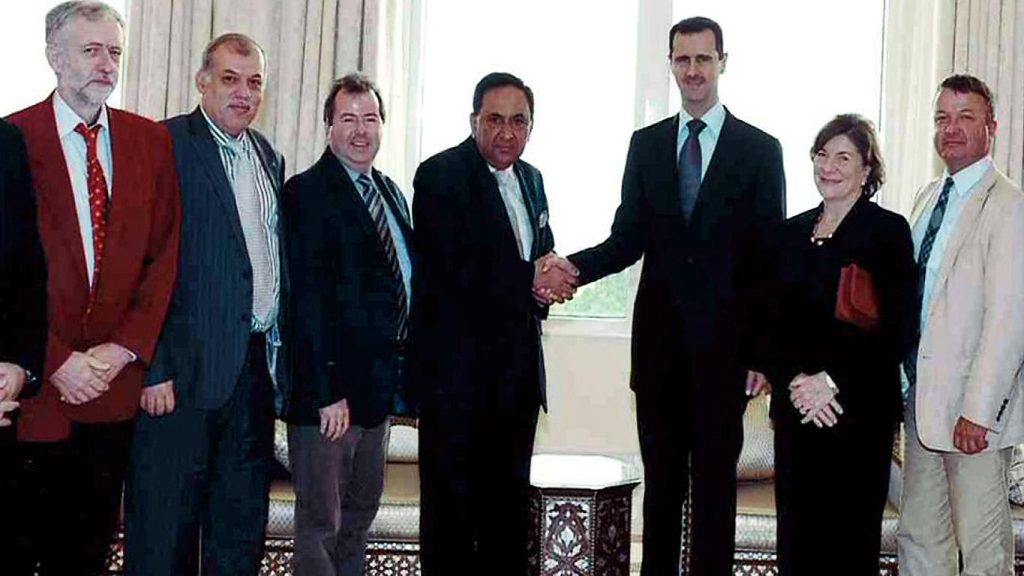
In 2014, another official of the Conservative Muslim Forum called for the government to end its boycott of the Muslim Council of Britain, an Islamist umbrella organization that was blacklisted by the Labour government in 2009 after one of its officials became a signatory to the Istanbul Declaration, which justified attacks on British troops and Jewish communities.
Groups such as the Conservative Muslim Forum may appear to be fringe groups. But it precisely because mainstream Conservativism tolerates these fringe groups that they end up serving as harbingers for mainstream Conservative behavior in the future.
The most concerning forerunner of future Islamist collaboration within the Right, however, can be found in its very extremes.
The Far-Right
Over the past few years, across the West, a small but growing number of politicians and activists from far-Right networks have embraced Islamist partners. British neo-Nazi Mark Collett’s interview with American Islamist hate preacher Daniel Haqiqatjou illustrated the reasons for this attraction of seeming radical opposites: a shared fear and hatred of Jews, “liberalism” and Western ideas of democracy and liberty.
Examples can be found all over the West. Andrew Tate, an obnoxious British-American social media “influencer” with millions of followers and connections to radical figures in the British and American far-Right, is perhaps the most curious example.
Tate has been excitedly welcomed by American Islamists, including prominent imams such as Nouman Ali Khan, for his claims that Islam is the “future” and his declarations that “first world Islamic countries” have none of the problems faced by the West, such as “broken” family values.
Interviewed on one popular American YouTube channel, and later shared by millions of Muslims around the world and republished by dozens of Western Islamist organizations, Tate explained:
Islam fixes a lot of the problems that men are currently facing. The problems we’re discussing on this show, Islam fixes all of them. … If I had to bet on one religion, as if I were betting on the stock market for the future, you have to bet on Islam. Because Muslims are intolerant, and I’m not saying that disrespectfully. Because if you’re tolerant of everything, then you stand for nothing.
…
I can walk through London with a t-shirt saying “Jesus is gay” and nothing will happen to me. If I did the same thing with the Islamic prophet, I’d be dead before I got to the end of the street. That’s how much they believe and respect, and I respect people who stick up for what they believe in. … Muslims are the only people who will defend their religion. They will defend their beliefs. They refuse to be mocked, they refuse to be insulted. … That’s an amazing thing about them.
…
Islam keeps society in the role where women obey their man, women have children, women have big families – women are exceptionally happy to do so. … You need to go to Islam. That’ll fix everything.
In October, Tate reportedly converted to Islam.
While the news was wildly applauded by many hundreds of Muslim activists on social media platforms, Conservative Islamic thinkers such as Ismail Royer were far from thrilled. Royer wrote: “Andrew Tate is a degenerate filthy pimp who deserves a brutal, humiliating public whipping.”
Similar hints of future unions can be found elsewhere. In France, the L’Union des démocrates musulmans français (UDMF) is an Islamist political party founded in 2012. Its officials include a leading former member of National Rally, France’s leading far-Right party, who still describes himself politically as “to the Right of the Right.”
The French far-Right has also enjoyed close contact with Iranian regime Islamists. And notorious French comedian Dieudonne M’bala M’bala – who popularized the quenelle, an inverted Nazi salute – has expressed support for both jihadists and French far-Right activists such as Alain Soral.
France is not a lone example. As Daniel Rickenbacher notes in European Eye on Radicalization:
First, in January 2018, Vona Gábor, the head of the Hungarian Far-Right party Jobbik, praised Islam as a bulwark against Western globalization and the decline of traditional values. He also advocates that Hungary’s foreign policy should move closer towards Iran.
Second, in December 2017, a German court convicted an ISIS sympathizer for having planned a terrorist attack against German soldiers. Interestingly, the wannabe-terrorist had been a Neo-Nazi just two years earlier. Before his conversion to Islam, he had published an article on a Far-Right blog crudely titled “He who incites against Islam hisses with the tongue of Judaism.”
In the United States, much was made of the pro-Taliban rhetoric found among “far-Right” groups on social media in 2021, following the fall of Kabul.
And in 2022, two members of the Boogaloo Bois (described by the ADL as an “anti-government extremist movement”) were sentenced to prison “for conspiring to provide material support and resources to Hamas, a designated foreign terrorist organization, for use against Israeli and U.S. military personnel overseas.”
These may be extreme examples. And the relevance of the far-Right to mainstream Conservativism in the West is of course debatable. But some of the justifications for these alliances is not so dissimilar to those found within increasing sections of the broader Right: fears of the excesses of progressivism; convoluted claims about a sinister “globalist” threat; and a growing disregard across much of the Right for traditional conservative ideas around liberty and individual rights.
An Islamist-Conservative Axis?
Conservative outreach to American Muslims comes at an interesting time. Republican flirtations with diaspora Muslim communities accompany growing efforts by foreign Islamist regimes to woo the American Right, along with growing arguments within American Islamist circles over the extent to which two decades of alliances with the Left have served to weaken their original radical causes and miseducate their children.
Anger at the perceived infusion of “progressivism” into American Muslim institutions has angered enough Islamists that a growing, public rejection of the Left is becoming increasingly apparent, and some now even regard the Right as a more natural home.
These changes, along with the excesses of the progressivists, perhaps partly explain a survey conducted by the Associated Press in 2020, which revealed that 35% of American Muslims voted for Trump in 2020. This can only have bolstered conservative efforts to embrace Muslim communities as allies, while ignoring the consequent empowerment of their Islamists.
But it is not just Islamists who see opportunity in Republican and other Right-leaning circles. Ordinary Muslims are becoming wealthier, and less likely to support the wealth redistribution ideas and left-leaning jargon advocated by Islamists aligned with the Left, such as expressed by officials of the Council on American-Islamic Relations.
As those who worked on George Bush’s presidential election campaign in 2000 know, this is a dangerous road down which to walk. But the politics of Islam and Islamism in the West is changing in other ways. American Islam in particular is no longer represented primarily by a single Islamist movement such as the Muslim Brotherhood, but it is torn between dozens of competing forces, both radical and not. With growing discontent among an increasingly prosperous and politically-fractured American Muslim middle class against their self-appointed Islamist leaders, there is a clear opportunity for conservatives across the West to capitalize with its new Muslim base.
Much has been written on the Right’s own ideological changes over the past few years. Some of this, as discussed above, can perhaps explain the phenomenon of Western Islam’s “akh-Right.”
Should remaining liberty-minded conservatives also continue to choose the wrong partners – funding and empowering American Islam’s Islamist leaders – then the Right risks affording Islamists political power and powerful credibility, allowing them to reaffirm radical control over Muslim communities; and (now armed with friends among both the Left and Right) advance their radical ideas further into Western polities more deeply than ever.
In general, the changing approach on the Right indicates a deeply worrying uninterest among conservatives on the question of Islamism, and a dismissal of the danger it continues to pose. These days, Islamism rarely gets a mention in British and American conservative political manifestos or media, in spite of the persistent jihadist threats, and continued extremist hold over so many Muslim communities.
Such disregard can only come back to haunt the Right later.
Sam Westrop is director of Islamist Watch, a project of the Middle East Forum
